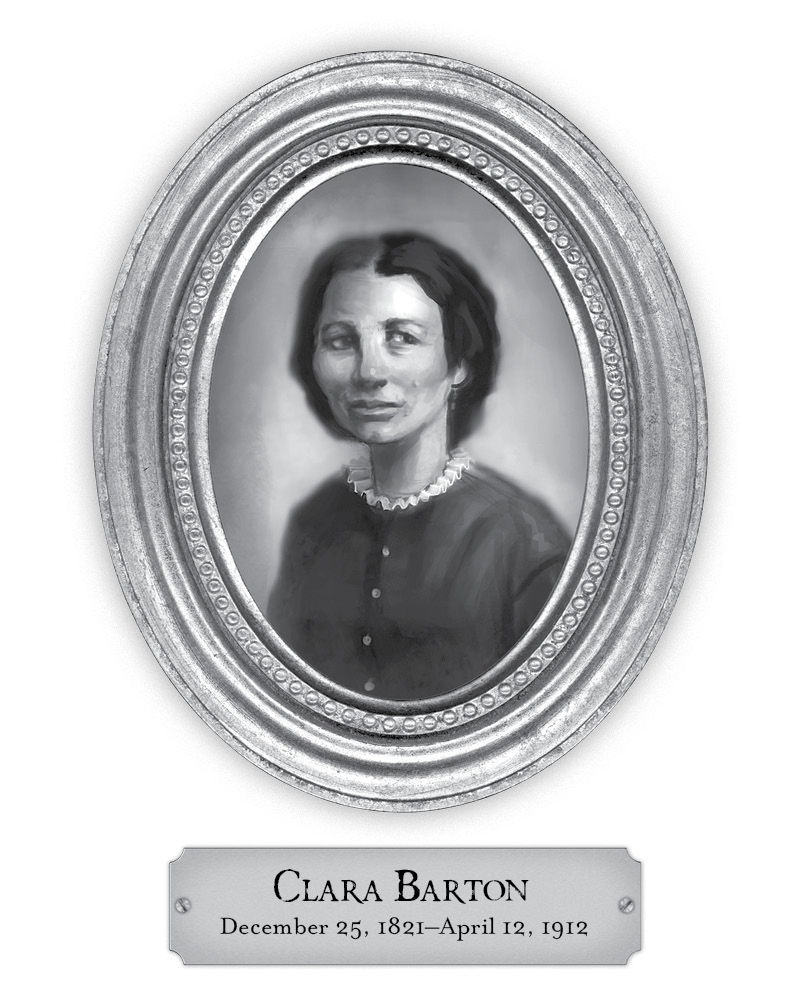Read Angel of the Battlefield Online
Authors: Ann Hood
Angel of the Battlefield (16 page)
Over the next days, school went as school does. There were secrets whispered, feelings hurt; homework given, math explained. Outside the classroom windows, more and more leaves turned from green to red and yellow. The air took on a chill, especially at night and first thing in the morning. Maisie and Felix's mother worked long hours at the law office, and they made themselves dinners of scrambled eggs or bologna sandwiches. With each passing day, Maisie hated Mrs. Witherspoon more, and Felix loved Miss Landers even more.
“You know,” Maisie said as Felix washed the dishes from their dinner one Friday night, “I think that whole experience was for us to get to know Great-Aunt Maisie. To maybe learn from her the way Clara learned from her great-aunt.”
Felix paused, then said quietly, “I want to go back.”
“Back to the Barton farm?” Maisie said.
He shook his head.
“You mean you want to go back to The Treasure Chest?” Maisie asked, surprised.
“I've thought about it, and yes, I want to try again.”
“No way,” Maisie said firmly.
“But you wanted toâ”
“I did. But it's too scary. Too unpredictable. We got back by accident this time. What if we got stuck next time? What if we weren't in a place as lovely as the Barton farm?”
“Oh, Maisie, we can't just stay cooped up here all the time,” Felix said.
Maisie looked at her brother as if he were a stranger. The boy who had to sleep with a light on, who couldn't even watch mildly scary movies, was suddenly willing to go back to The Treasure Chest and go anywhere at all.
“I don't know,” she said. “We could land in a war or a dungeon orâ”
“Or at 10 Bethune Street,” he blurted. “Or earlier this year.”
Maisie let the wonderful idea sink in. “Do you think we can? Really?”
Felix shrugged. “I don't know. But it's worth a try, isn't it?”
Maisie did not have to consider his proposition for too long.
“I suppose if we made it happen once, we might be able to do it again,” she said.
“This time, we have to think as hard as we can about New York City and our street. We have to concentrate all of our energy on that.”
Far below, they could hear the downstairs door open and then close, signaling that their mother was home from work.
“All right,” Maisie said. “I'm in.”
Felix extended his hand, and Maisie took it.
“Tomorrow night?” Felix asked.
Their mother's footsteps clomped up the stairs.
Maisie nodded. “To tomorrow,” she said.
“To yesterday,” Felix said.
Their mother's key jiggled in the lock. The door creaked open, and she walked in, tired and wrinkled. She paused, her key still in her hand, and studied them.
“Are you two up to something?” she asked.
Maisie and Felix shrugged.
“Who, us?” Maisie said.
Already they could see their old familiar street with the playground at one end and the Hudson River at the other, with the smell of the Laundromat mixing with Chinese food and exhaust hanging in the air, with their mother and father singing in the kitchen, and a whole world of happy possibilities right out the door waiting for them.

Â
Clara Barton was born Clarissa Harlowe Barton on Christmas Day, 1821, in Oxford, Massachusetts. She was the fifth and youngest child of Captain Stephen Barton and Sarah Stone Barton. Clara's father was a farmer and horse breeder, and it was his military stories about fighting in several Indian wars that inspired her patriotism, love of history, and, ultimately, her desire to aid wounded soldiers.
Clara's immediate family played an important role in her education. Clara's older sisters, Dolly and Sally, taught her to read at a very young age. Her brother Stephen tutored her in math, and her brother David taught her to horseback ride when she was five years old. But things changed in the Barton family when Clara was eleven. David fell from the rafters of a barn and was seriously injured. Clara dedicated herself to nursing him day and night for over two years.
Despite showing a talent for caring for the sick, Clara's parents urged her to pursue a career as a teacher. She taught in a school for ten years and eventually moved to Bordentown, New Jersey, where she started a free public school. The school was so successful that a new building was constructed and more teachers were hired. However, when the school hired a man as headmaster at a salary higher than Clara's, Clara demanded equal pay. The school refused to pay a woman the same salary that a man would get, so Clara resigned and took a new job in Washington, D.C.
In Washington, D.C., Clara was the first woman clerk hired in the patent office, and she earned the same salary as a man. Now Clara was more motivated than ever to help women obtain jobsâespecially in government servicesâand equal pay. It was around this time that she first became known as a pioneer for women's rights.
On April 19, 1861, a week after the Civil War began, troops from the Sixth Massachusetts regiment arrived in Washington. Clara went to the train station to meet the men, some of whom she had taught when they were schoolboys. The city was so crowded with other troops that the soldiers were sent to the Capitol building. But Clara took the most seriously wounded to her sister Sally's house and nursed them. She also gathered clothing, food, and other supplies for the soldiers from local merchants. Later in her life, she credited her father's own war stories and his patriotism with her desire to help the Civil War soldiers.
In 1861, Washington, D.C., became filled with wounded soldiers after a particularly bloody battle near Manassas, Virginia. Clara cared for the wounded, but soon she realized that the place she was most needed was the battlefield. She petitioned the government and leaders in the army and was allowed to take her wagons filled with supplies through the lines. She arrived at Culpeper, Virginia, two days after a fierce battle and immediately set to work at a poorly equipped field hospital. For two days and two nights, Clara tended the wounded soldiers.
These experiences with wounded soldiers confirmed her belief that she was needed on the battlefieldsânot back in Washington, D.C. She lobbied the Senate relentlessly for more supplies and better field hospitals, all the while nursing the wounded at major battles such as Antietam and Fredericksburg.
In 1865, after the Civil War ended, President Lincoln put Clara in charge of locating missing prisoners of war. She and her assistants answered thousands of letters that poured in, giving or requesting information about the dead and missing.
Around this time, a young Union soldier named Dorence Atwater came to Clara's door. While being held by the Confederates in a South Carolina prisoner of war camp, Dorence copied down an enormous list of dead soldiers' names. When Dorence was released from prison, he hid this list in a laundry bag and smuggled it through enemy lines. Afraid that the names of the men who had died would never get to their families, he asked Clara Barton to help him publish the list and find the families of the soldiers. She agreed. His list of nearly thirteen thousand men, later called “The Atwater List,” became famous and helped thousands of families learn the fate of their loved ones.
While Clara was on a vacation in Europe in 1870, the Franco-Prussian war broke out. She heard about the newly established International Committee of the Red Crossâa relief organization to help nurse wounded soldiersâand offered her services to them. Throughout the war, Clara set up aid centers in several war-torn cities and was awarded the Iron Cross, a special military honor.
Clara Barton began her campaign for an American Red Cross in 1873; however, she met resistance. Most Americans thought this organization was unnecessary since they could not imagine that the United States would ever again face a war as terrible as the Civil War. But Clara convinced President James Garfield that the new American Red Cross could respond to crises other than war. In 1882, that dream came true. Over the next two decades, Clara and the American Red Cross provided nurses, basic supplies, and aid centers in emergencies as varied as forest fires, floods, and outbreaks of typhoid and yellow fever.
The last contribution Clara Barton made to the American Red Cross was in September 1900. After the devastating hurricane and tidal wave that hit Galveston, Texas, and killed six thousand people, Clara established an orphanage. She also helped obtain the materials needed to rebuild houses and organized newspapers across the country to accept contributions on behalf of the relief effort.
Clara Barton was a pioneer in the field of nursing. She is famous as the founder of the American Red Cross. But she is perhaps most beloved for her role on the battlefields of the Civil War, where she earned the love and respect of thousands and became known as the Angel of the Battlefield.

Â
Felix landed with a splash. He opened his eyes and saw that he was underwater. Not just any water, either. This water was so clear that he could see Maisie's legs thrashing; a school of bright, yellow fish swimming past; and the soft, sandy bottom way, way beneath him. He swam upward, kicking his legs hard until he reached the surface. When his head finally popped out of the water, he took a big, deep breath and looked around. In the distance lay a white sand beach fringed with palm trees. But all around him Felix saw nothing but beautiful turquoise water. Until Maisie appearedâ sputtering and shaking the water from her hair, with the coin pressed firmly in her fist.
“Over here!” Felix called, waving to her. He had certainly not expected this. Not at all. They were in the ocean!
Maisie looked about as angry as she could look. Felix watched her dive into the water and swim purposefully toward him. She was a good swimmer. And so was he. They had learned to swim when they were five at the Carmine Street Pool and tied for first place in a relay race there when they were seven.
The sun shone bright and warm above them. Felix lay on his back and floated gently, gazing up at the clear, blue sky.
When Maisie reached him, she treaded water beside him.
“This,” she said, “is not New York.”
Felix smiled. “Nope,” he said.
“This is all your fault,” she said. “If you'd just let me find those blueprints, we wouldn't be in the middle of the ocean right now.”
“First of all, we're not in the middle of the ocean. The beach is right over there. Second of all, this is actually kind of nice.”
Maisie sighed. Clearly her brother was not going to be any help figuring out where they'd landed. Or why. She took a breath, stretched out her arms, and began to swim.
“Hey! Where are you going?” Felix called after her.
“To shore!” Maisie yelled back. And then she kept on swimming.
